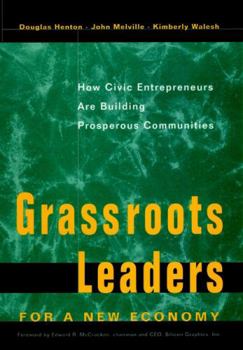Grassroots Leaders for a New Economy: How Civic Entrepreneurs Are Building Prosperous Communities
Select Format
Select Condition 
Book Overview
Customer Reviews
Rated 4 starsPrescription For Community Change In The Early 21st Century
Beginning several decades ago with Alvin Toffler and carried on by Peter Drucker, Thomas Friedman and a host of other writers, a number of examinations of change in our world and how we can/should/may cope with all of it have made their way to bookstore shelves. This current epistle by three writers who've had some hands on experience in working with communities who want to adapt to the switch in the United States from that...
0Report
Rated 5 starsNew hope for South Africa found in Amazon!
As we grapple to build a new society in South Africa, Grassroots Leaders for a new Economy shone like a beacon to show there is a way. A way to build trust and collaborative relationships in an emerging economy. Although based primarily on examples of US communities, many of the problems faced by cities and regions around the world have remarkable simialarities. There is much we can all learn from each other and this book...
0Report















